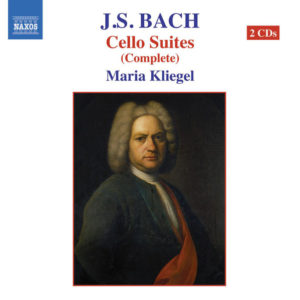
Maria Kliegel. Bach Cello Suites. Naxos 8.557280-81 Released 2005
Recorded May 2005 at the Phoenix Studio Budapest Hungary.
Instrument used Ex Gendron Stradivarius.
The Cellist.
Kliegel is a highly rated cellist who came to prominence in the 1980s. She has performed personally for Nelson Mandela and the German president Johannes Rau.
General observations.
General observations would start with the likening of the performance style to her former teacher Janos Starker. In addition, there are shades of Maisky and interestingly of Gendron. The latter was a previous custodian of the cello used in this recording. By this I mean the sound is BIG. There is plenty of vibrato and emphasis particularly in the lower register.
The Music.
Many movements are played loudly and with forced emphasis of key notes. Although there are contrasts, the overall impression is of maximum effort 80% of the time.
In contrast to this is the very restrained fifth Suite Allemende.
It is noticeable that the repeats in the Sarabandes are much quieter and played with delicacy. This gives light relief. The Sarabande of the fifth Suite even has the repeat as pizzicato! Strangely effective!
Some of the faster movements are played very fast. A case in point, the Gigue of Suite three is one of the only performances I have come across to date which slips under the 3 minutes with repeats!
I found listening to this recording was a little like following a driver who repeatedly accelerates and then applies the brakes when coming up to a slower vehicle in front. Rather than anticipating and taking the foot off the accelerator. Of course music would be very boring if played in the style of an advanced motorist but there is a happy medium I believe.
Conclusion.
Do you like friends who wave their hands about and tend to speak very fast so you miss out some of their words? Do they have fluctuating moods? If so, you may well love this performance! At the end of the day it is technically very accomplished and certainly not boring. However, it is not a recording I wanted to return to and certainly not relaxing. That is only my view, so if you like Maisky, Starker and Gendron, you must give it a listen.
Charles.
Maria Kliegel Naxos 8.557280-81 Released 2005
The Cellist.
Marie Kliegel won several prizes before coming to fame. Foremost of these being the Grand Prize at the 2nd Mstislav Rostropovich International Cello Competition in 1981.
From 1982 to 1991 the listing on Discogs indicates that she then released 3 albums but all with different labels. I find that intriguing.
By 1992 she had commenced her period as what would effectively be the “house cellist” with Naxos. Over the next 20 or so years she released over 30 albums for them. At one point 4 in a year and covering a wide repertoire.
Perhaps having to constantly turn her hand to different material affected this recording. There is much of my fellow reviewer’s thoughts I would agree with. I don’t propose a detailed review therefore but just some comments and additional thoughts.
Dealing with positives first, the technical skills on display are indeed impressive in their own right. I doubt there is much that Maria Kliegel couldn’t play and make an impressive sound.
Turning to the sound, the acoustic seems well balanced with just enough air around the cello. Furthermore, I have to admit I adore the Strad itself which allows a full, rich, and unfailingly musical (no excessive whine, or buzzing noises here) sound to be produced.
Interpretation.
However, as regards the interpretation. It may well impress a newcomer with the scale produced, but now having become a seasoned listener “faults” of exaggeration are frequently on display. I don’t see it quite in the Maisky (bold and powerful) or Gendron (forward and unpleasant) vein that my fellow reviewer, but for sure it is a big sound.
My colleague picked out a number of concerns in specific movements. I would like to add a couple here, both in Suite 6 (which as occasionally happens is annoyingly placed at the end of the first disc…).
The Courante is played fast with very even notes and aurally all present and correct. However, the overriding impression it left on me was “this is an academic exercise”. Now, we accept Bach may well have composed them as exercises, but posterity (and many other interpretations) have shown that there is so much more to be found. There is much music expressed in the notes of what is generally accepted as being the greatest canon of solo cello work out there.
My other comment relates to the final Gigue of this Suite, which should of course finish with a firm note signifying the culmination of the cycle. Instead Kliegel for some reason chooses to append a completely unnecessary ornamentation on it. For me, whilst it may be pretty, it is entirely inappropriate.
Conclusion.
So, in conclusion not a competitive reading, and perhaps showing the dangers of “hothouse” recording of so many different composers and pieces in a relatively short number of years.
Mark.